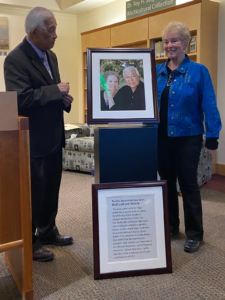SOU to host official memorial service for William Thorndike, Jr.
(Ashland, Ore.) — Southern Oregon University will host a public gathering and celebration of the life of William Downie (Bill) Thorndike, Jr. – a prominent statewide civic servant, the university’s first board chair and recipient of SOU’s highest honor – on Sunday, April 27.
Those who attend the event, at 1:30 p.m. in the SOU Music Recital Hall, are encouraged to wear something identifying their affiliation with Thorndike – whether a hat, uniform, sweatshirt or organizational nametag.
“We are honored to host Bill’s memorial service. His service to our university, and to organizations and groups throughout Oregon and beyond, was absolutely unmatched,” SOU President Rick Bailey said. “We will join his family in paying tribute to him and to the wide variety of causes that were so meaningful to him.”
Thorndike passed away at age 71 while vacationing with his wife, Angela, at the family’s cottage on Whidbey Island, Washington, on Feb. 15. He was a third-generation native of the Rogue Valley, graduating from Medford Senior High School in 1972.
He attended Simon Fraser University in Vancouver, B.C., then graduated from Portland’s Lewis and Clark College in 1976 with a bachelor’s degree in business administration. He then began his lifelong employment with the Thorndike family’s business, now known as Medford Fabrication. He was the company’s president and board chairman at the time of his death.
Thorndike’s public service included terms as president or chair of Asante health system, Pacific Retirement Service, SAIF Corporation, Oregon Business Council, Oregon Cultural Advocacy Coalition and Crater Lake National Park Trust. His particular interest in education led to his service as a member of the SOU Board of Trustees since its inception in 2015 and the board’s first chair, president of the SOU Foundation Board and member of the State Board of Higher Education, the Oregon Independent College Foundation, the Oregon Senate Committee on Educational Excellence and the Rogue Valley Workforce Development Council.
His influence also reached beyond Oregon’s borders. His expertise in finance and economics led to his service, including as chairman, with the U.S. Central Bank’s Federal Reserve Bank of San Francisco (Portland Branch).
He was particularly proud of being a fellow of the American Leadership Forum, and his many honors and awards included the SOU President’s Medal, the Chamber of Medford/Jackson County First Citizen Award, the Jackson County Community Service Coalition Person of the Decade, Willamette University’s Glenn L. Jackson Leadership Award and SOLV’s Tom McCall Leadership Award.
Thorndike is survived by his wife, Angela; brothers Dan and his wife Joan, and David and his wife Sally; and by five nieces and nephews.
In lieu of flowers, contributions can be made to the Oregon Community Foundation for the William and Angela Thorndike, Jr., Arts, Educational and Cultural Interest Fund (oregoncf.org/thorndike-fund).
-SOU-





 Both Roy Saigo, who currently heads a consulting business, and his wife, biologist Barbara Saigo, were present for the rededication ceremony, which was attended by about 50 people. The Saigos live in Ashland, and both spoke at the event about the importance of examining issues through multicultural lenses.
Both Roy Saigo, who currently heads a consulting business, and his wife, biologist Barbara Saigo, were present for the rededication ceremony, which was attended by about 50 people. The Saigos live in Ashland, and both spoke at the event about the importance of examining issues through multicultural lenses.



